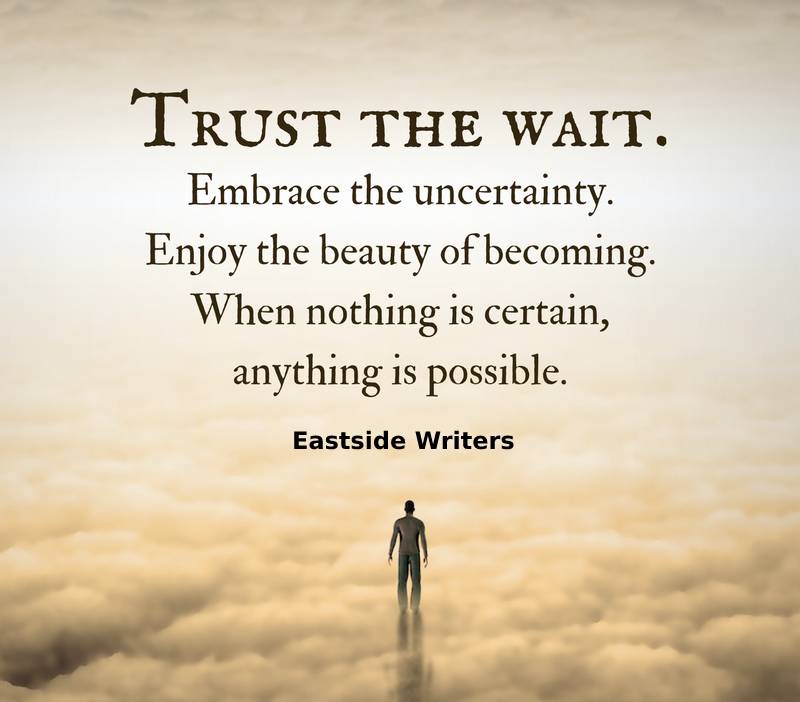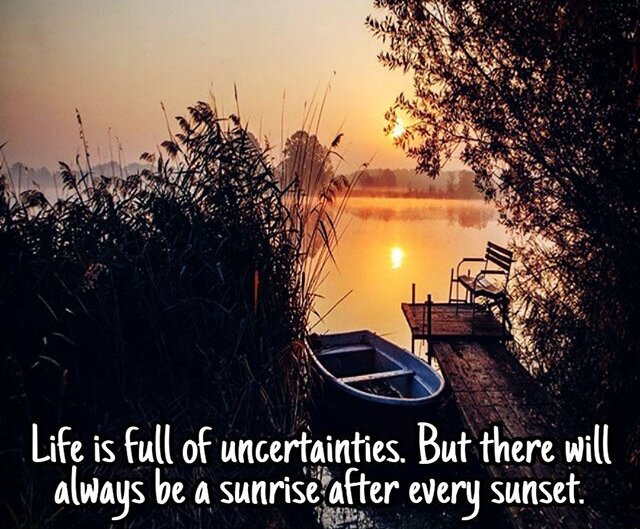Life is full of unknowns, which is why it is so vulnerable. You can’t predict its paths or outcomes, but you can enjoy its many forms. Experiments dating back to the 1960s show that when people know an unpleasant image or an electric shock is coming, they react less strongly than when they are not expecting it. This is because uncertainty, a well-known source of anxiety, makes it difficult to plan for and control events.

People’s desire to reduce uncertainty varies. Worriers focus on potential threats and risks, such as “what if I don’t get the promotion?” or “what if I get sick?” Worry can be beneficial when it leads to adaptive behaviors that reduce the threat, but chronic worry can result in harmful levels of stress that can affect heart health and immune system function, among other things.
Our bodies may exhibit subtle reactions to the uncertainty that we are unaware of. One experiment found that people who dislike uncertainty had higher blood pressure when faced with a threat. When our bodily reaction is strong, we tend to recognize and label it as anxiety; however, when it is subtle, we frequently fail to notice it despite its effect.
These internal reactions to uncertainty are normal, but they can lead us to act rashly, undermining our self-confidence, so it’s critical to be aware of them.
Not everything is bad.
Uncertainty aversion is linked to a variety of mental health issues, including eating disorders, social anxiety, anxiety disorders, and depression. People who dislike it a lot report more of these disorders happening at the same time.
But uncertainty isn’t all bad news; while it can make negative events worse, it can also make positive events more exciting.
A group of female university students was told that attractive males had seen their profile and may or may not have liked them in an experiment about the role of uncertainty in romantic attraction. Meanwhile, a second group was informed that the attractive males had clearly liked them. Women who were unsure whether they were liked were more attracted to men than women who were certain they were liked.
Difficulties in life arise when we are rigid in our responses to uncertainty and rely on attempts to control it. The more we try to avoid the distress that uncertainty brings, the less we are able to develop the ability to deal with uncertainty effectively. And if we choose to avoid distress, we may not stretch ourselves by trying new activities or speaking with new people. This reaction can keep us from having positive experiences that strengthen our self-esteem.
Indeed, rigidity, the polar opposite of flexibility, underpins unhealthy responses to a wide range of psychological issues. This is based on psychological research into thinking styles and perfectionism. Because life is never perfect, we must be comfortable making mistakes, learning from them, and lowering or changing our goals when they are thwarted. People who are flexible are more willing to reflect on disappointments, seek appropriate emotional support, and are less critical of themselves.
Uncertainty management
Many of us struggle with uncertainty, so here are a few strategies for dealing with it.
1) Determine the significance of an issue. When faced with a threat to their health, for example, or a major event such as the sale of their home, most people feel vulnerable. However, in less obvious circumstances, a bodily reaction to uncertainty may be triggered. Work, finances, competition, parenting, and friendships can all cause discomfort, tension, and other negative emotions.
2) Act when your uncertainty reaction is triggered and recognize how it affects your body. If it’s causing you stress, try a short meditation. This will not only help you right away, but it will also make you more aware of how your body reacts to uncertainty. Finally, it may help you tolerate feelings of uncertainty rather than waste time worrying about them.
3) Recognize thought errors that attempt to entice you into worrying. For example, “catastrophizing” is the tendency of our minds to exaggerate all the things that could go wrong. We can learn to challenge or even ignore our worries once we recognize this human tendency.
4) Don’t be fooled by an uncertain situation or your reaction to it. Allow yourself to experience negative emotions; they are, after all, natural. Talk to someone about your concerns if necessary, and then return to your own ability to handle disappointment.
5) If the uncertainty dissipates and you do experience a major disappointment, share your feelings with trusted others. Allow yourself time to consider what this means to you. The more we open up and communicate with others, the more our emotions dissipate (slowly but surely). Reflection and allowing feelings are not the same as indulging worries about uncertainty.
6) Uncertainty is an unavoidable aspect of life. Patience is required when dealing with uncertainty. To develop patience, set a realistic time frame for when the current situation will be resolved and avoid thinking about it until that time has passed. Meanwhile, engage in an activity that you enjoy or that has the potential to distract you. The best way to deal with it is to learn techniques that allow you to live with it without worrying about it.
Being open to this process allows us to adjust our expectations and redirect our energy and goals to areas where we can meet our expectations. If you do not receive a promotion at work, for example, you may choose to devote time to a sport or music that you did not previously prioritize.
Life is uncertain, but that uncertainty should not be avoided. Sadhguru writes in an op-ed for the Economic Times about how uncertainty should not be avoided. When you walk into unfamiliar territory, there is uncertainty, but there are also many possibilities.
Sadhguru: There is nothing certain in the outside world, that is a fact. It’s uncertain, and that’s what makes it difficult. Uncertainty implies that things are changing; there is no limbo. When you’re walking quickly, every step is a new adventure. Right now, you’re referring to this new terrain as “uncertainty.”

Life Is Full of Possibilities Because of Uncertainty
Uncertainty is the best time for those looking for opportunities. Those with a vision will make it a reality; those without will see it as a problem. But, because your mind is constantly in a state of compulsive reaction, you seek certainty.
Certainty is a limbo state. Isn’t it true that where there is a certainty, there is a status quo? In a business, political, or social situation, the status quo means that nothing changes or evolves. By seeking certainty, you are ultimately pitching for stagnation. You will become bored if things remain stagnant. When things happen quickly, you don’t have the balance to deal with it. So the issue isn’t uncertainty; the issue is that your interiority has become uncertain.
If we have to fix the entire world for you to be happy, that will never happen. Instead, we must repair your interiority. What exactly do we mean by that? It means that if your interiority is not obsessive, you will deal with every situation to the best of your ability. You may not be able to handle it like someone else, but you will handle it to the best of your ability. You will not suffer in every situation simply because you are in a compulsive state of reaction.
Liberation from Certainty and Uncertainty
Interiority is a dimension in and of itself. It cannot be shaped by external circumstances – “there is certainty in life right now, so I will have one type of interiority.” “Now that there is uncertainty, I will have a different kind of interiority.” “When the people around me are nice, I’ll have a certain kind of interiority. When people are mean to me, I have a different kind of interiority.” That is not how it works. It is not something you can control; it is something that exists. So, how do you keep it? So there’s no way to keep it. It will not be compulsive if it is conscious.
You came here with no monetary investment. And you’ll be leaving with no money in your pocket. Whatever happens in between, you are still on the winning side because all you have is a life experience. What matters is how you feel about it. So, if your interiority is non-compulsive and conscious, you control your experience. You determine only a portion of situations, and the rest is determined by the world. However, you have complete control over how you live your life.
Within Is the Secret to Blissful Chemistry
If you believe your work is important, the first thing you should do is work on yourself so that you are an internally stable being regardless of the external situation. It’s not just about you when you’re running a large company or enterprise. Often, you are surrounded by a thousand other people. So how you handle a situation affects not only your life but the lives of a thousand others.
There’s no doubt about it: as you grow, your challenges will naturally grow as well. But, if you want to put yourself in the shoes of a jockey and handle a horse or a situation, the first thing you must do is equip yourself. I can teach you how to create stable and blissful chemistry within yourself, which will greatly improve your ability to deal with all of life’s ups and downs. How? With the help of yoga.
Yoga allows you to sit here and notice that there is a little space between you and your body, a little space between you and your mind, and a little space between you and the world. The end of suffering comes when you create this space within yourself when you know what is you and what isn’t. You will be able to look at everything with utmost clarity and address every issue to the best of your intelligence and capability when there is no fear of suffering. You will never be overwhelmed by a situation.
In life, you need clarity rather than certainty.
Don’t consider how to transform everything into something else. Learn to see things for what they are. Clarity is required for this. If you want clarity, you need an unclouded and unprejudiced mind, one that is not in a state of confusion but rather in the lap of consciousness. That mind will perceive everything exactly as it is. Once this is established, you have the option of turning everything into an opportunity, or you can simply enjoy it as is. Life’s greatest possibilities are its uncertainties.
We are all faced with uncertainty, whether we are working to heal ourselves from a life of addiction or life’s obstacles seem to trip us up time and time again. There is no way to see into the future and see what awaits us. Uncertainty is a normal part of life.
There are many unknowns for those going through the recovery process. Do you even have the capacity to recover? Are you powerful enough? What else could you do to accelerate the process?
Fear and anxiety begin to take hold as all of these uncertainties accumulate in your mind. However, learning to accept life’s uncertainty is one of the keys to a successful Recovery. If you can do this, you will feel more optimistic as the process progresses.

Begin Your Journey With Life’s Uncertainty
Because of the uncertainty, most people fear the Recovery process. Recovery is not guaranteed. There is a chance of relapse. Dwelling on your fears and focusing on your potential failure, on the other hand, can lead to self-sabotage.
Uncertainty is an unavoidable aspect of life. On a daily basis, everyone feels it. From big to small, being unsure does not imply that you are lost or a failure. It simply means you’re alive.
You may feel overwhelmed by uncertainty at times, but if you can learn to deal with life’s uncertainty on a daily basis, you’ll be more confident and able to trust that everything will work out for the best. Accepting uncertainty, like any new thought pattern, will require to practice until it becomes second nature. Even as you progress through Recovery, working through these difficult feelings will allow you to develop self-confidence and faith in yourself.
Life Tips for Dealing with Uncertainty
One of life’s only certainties is that uncertainty will not go away. While learning how to deal with uncertainty is easier said than done, here are a few pointers to help you learn to accept rather than resist the uncertainties you experience:
Allow yourself to go: Recognizing that you cannot control everything is the first step toward accepting uncertainty. Instead of running away from it, recognise that each new challenge you face makes you stronger. So, don’t be afraid of or avoid uncertainties, including those concerning your Recovery.
Choose how you want to feel: When you resist your emotions, you give them more power than they deserve. Instead, allow yourself to experience all of the emotions associated with your uncertainty — anxiety, fear, self-doubt, and restlessness. You can gradually move through difficult emotions by allowing yourself to feel them.
Concentrate on what you have control over While you cannot control everything, you do have some control over a few things. This is exemplified by your demeanour. Instead of obsessing over what might or might not happen in the future and becoming paralysed by fear, maintain a positive attitude toward what is happening now.
Be open to new experiences: Uncertainty isn’t always a bad thing. When you are prepared and open to surprises, you will learn and experience things you could never have imagined.
Take chances: Uncertainty can render you immobile and unable to move forward. Moving forward to becoming a healthier individual comes with risks for those in Recovery, but it’s worth it because you’re worth it.
Be courageous: Fear and uncertainty are inextricably linked. Nonetheless, as Amelia Earhart put it, “courage is the price that life exacts for granting peace.”
Learn to Be Resilient in the Face of Life’s Uncertainty.
You will realise how resilient and strong you are as you learn to accept uncertainty. Even as you travel the long road of Recovery, you can start to trust yourself more and relax even when obstacles try to stymie your progress.
It’s difficult to live with so much uncertainty. Humans crave future information in the same way that they crave food, sex, and other primary rewards. Our brains perceive ambiguity as a threat and attempt to protect us by reducing our ability to focus on anything other than creating certainty.
According to research, job uncertainty, for example, has a greater impact on our health than actually losing our job. Similarly, participants in the study who were told they had a 50% chance of receiving a painful electric shock felt far more anxious and agitated than participants who believed they would definitely receive the shock.
It’s no surprise, then, that entire industries have sprung up to fill in the blanks of our futures. Consider the popularity of astrology apps or the prestige of management consultancies specialising in strategic planning. Fundamentalist religions alleviate anxiety by establishing unambiguous rules and absolute truths. Conspiracy theories offer straightforward explanations for complex phenomena.
However, it is sometimes—perhaps always—more effective not to attempt to create certainty. Though evolution may have hardwired our brains to be resistant to uncertainty, we can never truly know what the future holds. And, in unlikely circumstances such as the pandemic, which has massively disrupted our routines and completely destroyed our best-laid plans, we must learn to live with ambiguity. “The only certainty there is is uncertainty,” wrote mathematician John Allen Paulos. “The only security is knowing how to live with insecurity.”

So, how do we cope when everything seems out of control? Here are seven modes of action which benefit immensely;
1. Do not oppose
There is no doubt that we are living in difficult times. Resisting the current reality, on the other hand, will not help us recover, learn, grow, or feel better. Resistance, ironically, prolongs our pain and difficulty by amplifying the difficult emotions we are experiencing. There is some truth to the adage that what we resist persists.
There is another option. We can practise acceptance instead of resisting, iis a counterintuitive key to happiness. Acceptance entails meeting life where it is and moving on from there.
Acceptance allows us to see the reality of the situation in the present moment, allowing us to move forward rather than being paralysed (or rendered ineffective) by uncertainty, fear, or argument. To practise acceptance, we must let go of our resistance to a difficult situation, as well as our feelings about it.
For example, you may be experiencing difficulties in your marriage right now. Instead of criticising or blaming your spouse, which are both forms of resistance, you could accept your marriage for the time being.
That doesn’t mean you won’t be frustrated, disappointed, or saddened by the state of affairs. Accepting how we feel about difficult circumstances (and difficult people) in our lives is a big part of acceptance. However, allowing our difficult marriage to be as it is now—and acknowledging our feelings about it—puts us in a better position to move forward.
To be clear, acceptance is not synonymous with resignation. Accepting a situation does not imply that it will never improve. We don’t accept that things will always be the same; but, we only accept what is happening right now. We can work to make our marriage happier while accepting the reality that the relationship or situation is complicated right now. Maybe it will improve, maybe it won’t. Acceptance in the face of adversity is difficult, but it is also the most effective way to move forward.
2. Make an investment in yourself.
YOU are the best resource you have right now for making a difference in the world. When that resource runs out, your most valuable asset suffers damage. In other words, when we underinvest in our bodies, minds, or spirits, we destroy the most important tools we have for living our best lives.
We humans do not fare well when we put off self-care. We must maintain the relationships that provide us with connection and meaning. When we are tired, we must get enough sleep and rest. We need to spend time having fun and playing for the sake of having fun.
Don’t be perplexed: Self-care is not self-indulgent. Selfishness is an obsessive focus on oneself. Selfish people frequently use words like “I,” “me,” and “mine” to refer to themselves. They pursue extrinsic goals such as preserving their youthful beauty or cultivating a social media image of themselves. They frequently crave more money, power, and approval from others, and they are often willing to pursue these things at the expense of others or their own integrity. Self-centeredness has been linked to stress, anxiety, depression, and health issues such as heart disease.
As a result, I strongly oppose selfishness. I advocate for self-care and personal development.
3. Look for healthy comfort foods.
One of the most important ways we can invest in ourselves is to find healthy ways to comfort ourselves.
We need to feel safe and secure if we are to remain flexible. When we are uncertain or insecure, our brain attempts to help us by activating our dopamine systems. This dopamine rush motivates us to seek rewards, making temptations even more appealing. Consider this your brain pushing you toward a comfort item, such as an extra glass of wine, rather than a reasonable bedtime. Or a whole pan of brownies. Or a little something extra in your Amazon cart.
Instead of turning to social media, junk food, or alcohol to calm our nerves, we do better when we comfort ourselves in healthy ways ahead of time.
Make a list of healthy ways to relieve stress. Can you put on a mask and go for a hike with a neighbour? Do you want to call a friend? Consider what you are thankful for. Allow yourself a short nap? Maybe you should look for a hug or watch a funny YouTube video.

These things may appear insignificant, if not luxurious, but they allow us to be the people we want to be.
4. Don’t believe everything you hear or read.
The most important stress-reduction technique anyone has ever taught me is not to believe everything I think. It is especially important in uncertain times not to believe thoughts that argue for the worst-case scenario.
It can be beneficial to consider worst-case scenarios in order to weigh risks and actively prevent disaster. When we believe these stressful thoughts, however, we tend to react emotionally as if the worst-case scenario is already happening in real life, rather than just in our heads. We mourn for things we haven’t actually lost, and we react to things that aren’t actually happening. When we are alone with our thoughts, we feel threatened, afraid, and unsafe.
Putting Negative Events in Perspective
Putting Negative Events in Perspective
Take a step back and examine your emotions without dwelling on them.
Our negativity bias can also cause us to fail. Expectations have the potential to become a self-fulfilling prophecy. When we expect the worst, we are often too afraid or closed-minded to take advantage of opportunities or respond to challenges with creativity and grit.
Rather than accepting every stressful thought, we can actively imagine the best-case scenario. We can replace our ruminations with silver linings. This goes against our natural tendency to exaggerate risks and negative consequences.
5. Pay close attention
The inverse of uncertainty is present, not a certainty. Instead of imagining a terrifying and unknown future, we can focus on our breath. We can then check in with ourselves. For example, every time we wash our hands, we could ask ourselves, “How are you doing right now?”
Take note of the emotions you are experiencing and where they are occurring in your body. Bring a sense of wonder and acceptance to your experience.
Even when it appears that we have no control over anything, we can still control what we pay attention to. We can disable our alerts to prevent the news or social media from hijacking our attention. We can let go of our ruminations and negative fantasies by paying attention to what is happening in our inner world right now, in the present.
Attending to what is going on within us at any given time prevents a bad external reality from dictating our inner truth. It enables us to develop a calm, open-mindedness, and non-reactivity.
6. Give up looking for someone to save you.
When we act powerless, we become trapped in narratives that leave us angry, helpless, and trapped. And we begin to hope that other people will come to our aid and rescue us from our predicament.
Although it feels good to be pampered by others, most rescuers are ineffective. Our friends may want to save us because it makes people feel good to help others, and their intentions may be noble. However, rescuers are better enablers than saviors. If we stay stuck, they get to keep their role as our heroes, or they can divert their attention away from their own problems.
Rescuers often allow us to avoid taking responsibility for our own lives. Friends who are emotionally supportive (or therapists) see us as capable of solving our own problems. They ask questions that help us focus on what we want rather than what we don’t want.
“The only certainty is that there is uncertainty.”
In a nutshell, we need to stop whining in order to deal with uncertainty effectively. When we let go of our fixation on the problem, we can concentrate on the desired outcomes. How can we make the best of this situation? What do we stand to gain in this situation?
When we take charge of our lives, we exchange the false power of victimhood for the true power that comes from creating the life we want.
7. Look for meaning in the midst of chaos.
Meaning, as it relates to our lives, is defined by social psychologists as “an intellectual and emotional assessment of the degree to which we feel our lives have purpose, value, and impact.” We, humans, are most motivated by our importance to others. When we know that our efforts are benefiting someone else, we will work harder, longer, and better—and feel better about our work.
Teens who provide tangible, emotional, or informational assistance to people in crisis, for example, tend to feel more strongly connected to their community. According to research, we feel better when we stop thinking about ourselves so much and instead focus on others.
When we notice something that needs to be improved, the next step is to consider what we can do as individuals to contribute to the solution. What skills and talents (or even just interests) can we bring to bear on the problem? What is truly important to us, and how can we help?

Meaning and purpose are sources of hope. When the world feels scary or uncertain, knowing what we mean to others and having a sense of purpose can help us to feel more grounded than anything else.
So, don’t just sit back and wait for this ordeal to be over. Don’t accept your misery while we wait for a vaccine. What is something you’ve always wanted to do? What are you hoping for as a result? How do you make a real-life out of this? That is your life to live.
Note: Contact our Writers at www.eastsidewriters.com for writing Blogs/Articles on any niche. We have experts in various domains from Technology to Finance and from Spirituality to Lifestyle and Entertainment.







Pingback: Last and Final Moment Of One's Life And Its Consequences